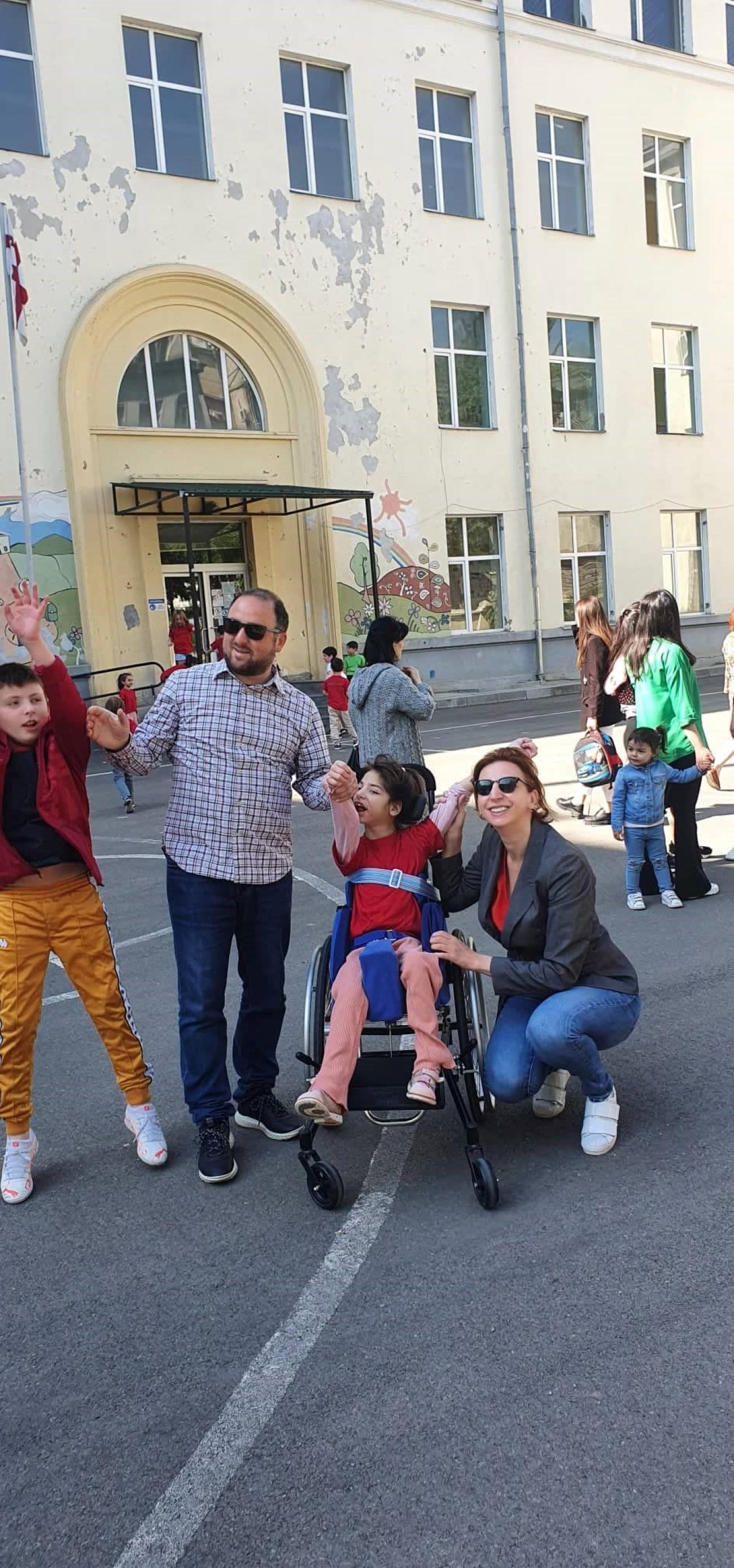On 5 November 2013, Mariam Gelashvili and her family welcomed a beautiful baby girl, Nina. Unfortunately, Nina suffered from birth asphyxia, which resulted in her spending 1 month in the intensive care unit (ICU) and consequently losing function in her arms, legs, and neck region. Soon after leaving the ICU, she started to receive rehabilitation therapy for quadriplegia.
Nina, now 8 years old, has severe motor impairment, cannot speak, and struggles with holding her head up, sitting up, standing and walking independently. Despite her disability, she attends a public school in Tbilisi, Georgia, and completed first grade this summer. Mariam tells us how assistive technology (AT) and communication devices have played and continue to play an essential role in improving her daughter’s quality of life.
Assistive technology improves communication and social interactions
“Nina has excellent cognitive skills,” explains Mariam. “When she turned 4, I was advised to buy an eye gaze device to help her communicate with us better. An eye gaze device allows a person to control a tablet or computer using their eyes. She mainly uses this device at home, just like one would use communication cards. I have created cards for her to express when she is hungry, wants to go outside, or watch TV. When she selects a card, she is asked a follow-up question. For example, when she indicates that she wants to watch TV, she is shown a list of shows to choose from.”
Although the device helps Nina communicate her needs, her poor vision does not permit her to spend more than 1 hour a day on the tablet. In addition, as she grows, so do her needs. She now relies on 2 different speech-generating devices to communicate with her peers at school. These devices allow her to share several pre-recorded messages by just tapping on a large, coloured button. Mariam has programmed several greetings, questions, and answers within the device to facilitate her social interactions. “Every morning, I prepare new recordings, which also include information about her previous day, so that when she is asked about it, she can respond easily,” says Mariam.
The speech devices have also helped Nina interact with her classmates directly. “Sometimes Nina gets bored in the classroom and starts feeling restless,” she adds. “I have programmed a command for her to indicate when she wants to go out. When her classmates hear her press this command, those sitting next to her usually turn to her and explain that they also want to go out but need to be patient.”
At school, Nina is supported by her homeroom teacher, a special needs teacher, and a personal assistant who spends the entire day with her. Her elementary school is taking additional steps to ensure she is included in all school activities and does not feel left out. For example, with the help of her devices, she assists her teachers in asking questions to her peers. During music or sports classes, where her participation is somewhat limited, she has been assigned the task of using her controls to indicate the start of the activity. Nina also enjoys listening to her classmates, so her teachers involve her in class discussions regularly by asking her for feedback on her classmates' responses.
Consort World changing lives in Georgia
Limited access to AT remains a challenge in Georgia, as does the lack of trained therapists with knowledge in this particular field. Consort World has been a renowned and trusted name in AT and eye tracking since 2006 in the Middle East and North Africa. With financial support from Consort World's Managing Director, Camille Matta, Mariam founded Consort Georgia to support Georgian children with special needs. Recently, the nongovernmental organization joined forces with one of the biggest local rehabilitation centres, the Ken Walker University Clinic for Medical Rehabilitation, to provide children with AT-aided therapy and training for health workers. The Ken Walker Clinic now hosts Consort Georgia, and together they are increasing awareness of and access to AT across the country.
Thanking WHO/Europe for its continued support to the country, Mariam says, “It means a lot, especially for families with disabled children. So many countries, like ours, face continued challenges in providing inclusive high-quality health care. Without WHO Georgia’s support, the situation would be worse.”
WHO/Europe is working with the Government of Georgia to strengthen access to rehabilitation services and assistive products in the country. The programme is supported by the United States Agency for International Development (USAID).


